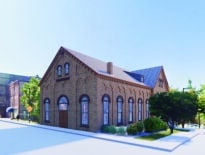
Challenging financial conditions have delayed groundbreaking of condominium projects in Boston such as a 43-unit development at 3326 Washington St. in Jamaica Plain. Critics say Mayor Michelle Wu’s proposed changes to the city’s inclusionary development policy would make new condo development impossible in many neighborhoods. Image courtesy of Primary Development Group
Policymakers in Boston could be facing a catch-22 while pursuing a pair of popular but potentially contradictory goals: encouraging developers to build more residential condominiums while requiring a higher percentage of income-restricted units.
Mayor Michelle Wu’s proposed changes to the city’s inclusionary development policy would make financing for most new condo projects impossible in the city’s low- and moderately-priced neighborhoods, some developers and real estate advisors say. They point to difficulties for a growing list of approved but stalled condo projects in Jamaica Plain and Readville, illustrating the already-high financial hurdles facing developers.
“There is absolutely a tightening on the commercial lending side, and banks are doing fewer deals,” said William Senné, CEO of Boston-based Senné Real Estate. “That is definitely forcing some projects to market.”
After receiving Boston Planning & Development Agency approval for a 43-unit condo project in Jamaica Plain in 2020, Cambridge-based Primary Development Group LLC recently hired Cushman & Wakefield to market the 3326 Washington St. property that it acquired in 2019 for $2.7 million.
The BPDA reviews multifamily projects with at least 15 housing units. Boston’s zoning code does not distinguish between apartments and condominiums, allowing developers to pursue either option or a mixture, depending upon their business plan.
But elected officials, neighborhood groups and housing activists have pressed the BPDA in recent years to encourage the condo option, to increase neighborhood stability and offer wealth-building opportunities for buyers.
Changes Could Have Unintended Effects
Wu’s proposal would update the inclusionary development policy – which sets minimum percentages for affordable units in multifamily projects and income limits for those units’ residents – for the first time since 2015.
Like the existing policy, it breaks up the city into three zones based upon average housing prices, with slightly different requirements. As a baseline, projects in all three zones are required to include 13 percent affordable units.
For condo projects in Jamaica Plain and other neighborhoods representing the top two-thirds of the city’s housing prices, the affordable component would increase from 13 to 20 percent of the buildings’ dwelling areas.
“It’s a strange policy and it’s going to have the opposite effect [as the intent],” said Lee Goodman of Watermark Development, which received approval in 2021 to redevelop the former Doyle’s Cafe property in Jamaica Plain as 29 condominiums.
Goodman points to the findings of the city’s consultants, RKG Assoc., which issued a report last year concluding that condo projects in a large portion of the city wouldn’t be financially feasible under the revisions.
For a condo project to pencil as profitable, RKG assumed developers would need to achieve a 20 percent internal rate of return.
Under that assumption, condo developments would not be feasible in Dorchester, Hyde Park, Jamaica Plain, Mattapan, Roxbury and West Roxbury, the report stated.
Developers’ costs would be outweighed by the lower average sales prices in such neighborhoods, cited in the report as $735 per square foot in Jamaica Plain, compared with nearly $1,200 per square foot in and around downtown Boston.
Condos also cost more to build than apartments – an average of $50 per square foot, according to RKG’s analysis – and both property types have seen steep construction cost escalation in recent years.
Jason Weissman, senior partner of Boston Realty Advisors, said interest rate hikes have already sidelined many multifamily projects.
“Deals are not penciling right now,” Weissman said. “This has nothing to do with any of the new regulations, or changes in the [Boston inclusionary development policy]. It 100 percent has to do with just construction costs and your return on cost. More equity is being required for properties right now, and that’s how these deals are having a difficult time getting out of the ground.”
Readville Project Set to Drop Condos
Under Wu’s proposal, the minimum affordable component would remain 13 percent in lower-priced neighborhoods such as Hyde Park, Readville and Dorchester. Even under the existing requirements, one major transit-oriented housing project has been stalled since 2020.
Boston-based developer Ad Meliora Asset Management is seeking to eliminate the 151-unit condo component of its Residences at Readville Station project at 1717 Hyde Park Ave., and build all 273 housing units as apartments. In a BPDA filing, developers blamed financial challenges for the condo component.
Wu’s proposed IDP changes would have the biggest negative effect on housing production in outlying neighborhoods with lower condo prices, said Joseph Hanley, a partner at McDermott, Quilty & Miller LLP in Boston.
“The one thing with condos is it costs you the same to build in South Boston as it would in Hyde Park, but the sale-outs are completely different,” he said.
Hanley, who represents many developers seeking BPDA approval, said the city should consider increased height and density to make the IDP goals financially feasible.

Steve Adams
Somerville also has a 20 percent IDP minimum, but its 2019 citywide zoning created building heights up to 300 feet in some neighborhoods, enabling developers to subsidize the affordable units with larger projects.
In Boston, merely increasing base building heights to 69 feet, or the maximum under building codes for wood-frame construction, would hit a sweet spot for many multifamily projects, Hanley said.
“There are neighborhoods where that’s going to be a little bit too much for people, and there are parts where it’s a no-brainer,” he said. “That’s going to get to the numbers that we need, and that should be the starting point.”
Wu’s proposal is subject to approval by the BPDA board, Boston Zoning Commission and Boston City Council. A public comment period on the changes expired Wednesday, and an additional public meeting on the proposal will be scheduled in the coming weeks, a BPDA spokesperson said.





